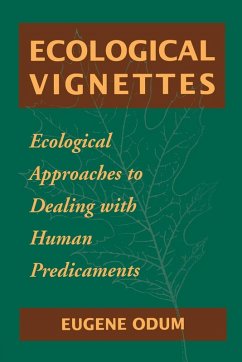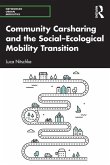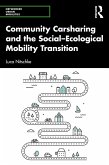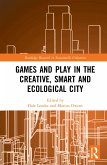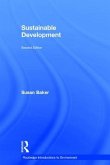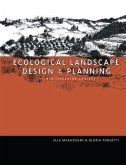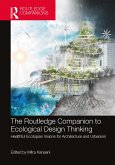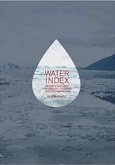Eugene P Odum
Ecological Vignettes
Eugene P Odum
Ecological Vignettes
- Broschiertes Buch
- Merkliste
- Auf die Merkliste
- Bewerten Bewerten
- Teilen
- Produkt teilen
- Produkterinnerung
- Produkterinnerung
First Published in 2004. Written by one of the most highly regarded U.S. ecologists, this book presents basic ecological principles in a series of vignettes, illustrated by cartoons and simple diagrams, covering such subjects as growth, energy, ecological change, diversity, economics and technology, among others. Drawing upon essays written during a forty-year career as a teacher, research and ecologist, this volume about environmental literacy is written for the general reader and understandable at any level from grade school to senior citizen.
Andere Kunden interessierten sich auch für
![Community Carsharing and the Social-Ecological Mobility Transition Community Carsharing and the Social-Ecological Mobility Transition]() Luca NitschkeCommunity Carsharing and the Social-Ecological Mobility Transition60,99 €
Luca NitschkeCommunity Carsharing and the Social-Ecological Mobility Transition60,99 €![Community Carsharing and the Social-Ecological Mobility Transition Community Carsharing and the Social-Ecological Mobility Transition]() Luca NitschkeCommunity Carsharing and the Social-Ecological Mobility Transition185,99 €
Luca NitschkeCommunity Carsharing and the Social-Ecological Mobility Transition185,99 €![Games and Play in the Creative, Smart and Ecological City Games and Play in the Creative, Smart and Ecological City]() Games and Play in the Creative, Smart and Ecological City185,99 €
Games and Play in the Creative, Smart and Ecological City185,99 €![Sustainable Development Sustainable Development]() Susan BakerSustainable Development237,99 €
Susan BakerSustainable Development237,99 €![Ecological Landscape Design and Planning Ecological Landscape Design and Planning]() Jala MakhzoumiEcological Landscape Design and Planning235,99 €
Jala MakhzoumiEcological Landscape Design and Planning235,99 €![The Routledge Companion to Ecological Design Thinking The Routledge Companion to Ecological Design Thinking]() The Routledge Companion to Ecological Design Thinking285,99 €
The Routledge Companion to Ecological Design Thinking285,99 €![Water Index Water Index]() Seth McDowellWater Index38,00 €
Seth McDowellWater Index38,00 €-
-
-
First Published in 2004. Written by one of the most highly regarded U.S. ecologists, this book presents basic ecological principles in a series of vignettes, illustrated by cartoons and simple diagrams, covering such subjects as growth, energy, ecological change, diversity, economics and technology, among others. Drawing upon essays written during a forty-year career as a teacher, research and ecologist, this volume about environmental literacy is written for the general reader and understandable at any level from grade school to senior citizen.
Hinweis: Dieser Artikel kann nur an eine deutsche Lieferadresse ausgeliefert werden.
Hinweis: Dieser Artikel kann nur an eine deutsche Lieferadresse ausgeliefert werden.
Produktdetails
- Produktdetails
- Verlag: Routledge
- Seitenzahl: 288
- Erscheinungstermin: 23. Oktober 1998
- Englisch
- Abmessung: 229mm x 152mm x 16mm
- Gewicht: 421g
- ISBN-13: 9789057025228
- ISBN-10: 9057025221
- Artikelnr.: 23599628
- Herstellerkennzeichnung
- Libri GmbH
- Europaallee 1
- 36244 Bad Hersfeld
- gpsr@libri.de
- Verlag: Routledge
- Seitenzahl: 288
- Erscheinungstermin: 23. Oktober 1998
- Englisch
- Abmessung: 229mm x 152mm x 16mm
- Gewicht: 421g
- ISBN-13: 9789057025228
- ISBN-10: 9057025221
- Artikelnr.: 23599628
- Herstellerkennzeichnung
- Libri GmbH
- Europaallee 1
- 36244 Bad Hersfeld
- gpsr@libri.de
Eugene Odum is the Callaway Professor Emeritus of Ecology, Alumni Foundation Distinguished Professor Emeritus of Zoology and Director Emeritus of the Institute of Ecology at the University of Georgia in Athens.
Chapter 1 What WE Learn From Ecology About Growth
Chapter 2 What We Learn From Ecology About Energy
Chapter 3 What We Learn From Ecology About Organization
Chapter 4 What We Learn From Ecology About Change
Chapter 5 What We Learn From Ecology About Behavior
Chapter 6 What We Learn From Ecology About Diversity
Chapter 7 Human Ecology
Chapter 8 Bottom Lines
Part I Essays and Commentaries for Further Reading
essay1 Harmony Between Man and Nature, Eugene P.Odum
essay2 Optimum Population and Environment: A Georgian Microcosm, Eugene P.Odum
essay3 The World's Most Polymorphic Species: Carrying Capacity Transgressed Two Ways, William R.Cotton Jr
essay4 How to Prosper in a World of Limited Resources: Lessons from Coral Reefs and Forests on Poor Soils, Eugene P.Odum
essay5 How Universities Should Grow, Eugene P.Odum
essay6 Energy: The Common Denominator, Eugene P.Odum
essay7 Production, Maintenance and Environmental Law, Eugene P.Odum
essay8 Ecosystem Management:A New Venture for Humankind, Eugene P.Odum
essay9 The Watershed as an Ecological Unit, Eugene P.Odum
essay10 Natural Areas as Necessary Components of Man's Total Environment, Eugene P.Odum, Howard T.Odum
essay11 Energy, Ecosystem Development,and Environmental Risk, Eugene P.Odum
essay12 The Transition from Youth to Maturity in Nature and Society, Eugene P.Odum
essay13 Reduced-Input Agriculture Reduces Nonpoint Pollution, Eugene P.Odum
essay14 When to Confront and When to Cooperate, Eugene P.Odum
essay15 The Search For The Evil Kingdom, Eugene P.Odum
essay16 Diversity in the Landscape: The Multilevel Approach, Eugene P.Odum
essay17 Diversity and the Survival of the Ecosystem, Eugene P.Odum
essay18 The Pricing System, Eugene P.Odum
essay19 Energy, Ecology, and Economics, Howard T.Odum
essay20 Prerequisites for Sustainability, Eugene P.Odum
essay21 Environmental Degradation and the Tyranny of Small Decisions, William E.Odum
essay22 Bridging the Four Major "Gaps" that Threaten Human and Environmental Quality, Eugene P.Odum
essay23 Biotechnology Presents a Challenge to the Campus, Eugene P.Odum
essay24 Source Reduction, Input Management, and Dual Capitalism, Eugene P.Odum
essay25 Earth Stewardship, Eugene P.Odum
essay26 Ecology: The Common-Sense Approach, Eugene P.Odum
Chapter 2 What We Learn From Ecology About Energy
Chapter 3 What We Learn From Ecology About Organization
Chapter 4 What We Learn From Ecology About Change
Chapter 5 What We Learn From Ecology About Behavior
Chapter 6 What We Learn From Ecology About Diversity
Chapter 7 Human Ecology
Chapter 8 Bottom Lines
Part I Essays and Commentaries for Further Reading
essay1 Harmony Between Man and Nature, Eugene P.Odum
essay2 Optimum Population and Environment: A Georgian Microcosm, Eugene P.Odum
essay3 The World's Most Polymorphic Species: Carrying Capacity Transgressed Two Ways, William R.Cotton Jr
essay4 How to Prosper in a World of Limited Resources: Lessons from Coral Reefs and Forests on Poor Soils, Eugene P.Odum
essay5 How Universities Should Grow, Eugene P.Odum
essay6 Energy: The Common Denominator, Eugene P.Odum
essay7 Production, Maintenance and Environmental Law, Eugene P.Odum
essay8 Ecosystem Management:A New Venture for Humankind, Eugene P.Odum
essay9 The Watershed as an Ecological Unit, Eugene P.Odum
essay10 Natural Areas as Necessary Components of Man's Total Environment, Eugene P.Odum, Howard T.Odum
essay11 Energy, Ecosystem Development,and Environmental Risk, Eugene P.Odum
essay12 The Transition from Youth to Maturity in Nature and Society, Eugene P.Odum
essay13 Reduced-Input Agriculture Reduces Nonpoint Pollution, Eugene P.Odum
essay14 When to Confront and When to Cooperate, Eugene P.Odum
essay15 The Search For The Evil Kingdom, Eugene P.Odum
essay16 Diversity in the Landscape: The Multilevel Approach, Eugene P.Odum
essay17 Diversity and the Survival of the Ecosystem, Eugene P.Odum
essay18 The Pricing System, Eugene P.Odum
essay19 Energy, Ecology, and Economics, Howard T.Odum
essay20 Prerequisites for Sustainability, Eugene P.Odum
essay21 Environmental Degradation and the Tyranny of Small Decisions, William E.Odum
essay22 Bridging the Four Major "Gaps" that Threaten Human and Environmental Quality, Eugene P.Odum
essay23 Biotechnology Presents a Challenge to the Campus, Eugene P.Odum
essay24 Source Reduction, Input Management, and Dual Capitalism, Eugene P.Odum
essay25 Earth Stewardship, Eugene P.Odum
essay26 Ecology: The Common-Sense Approach, Eugene P.Odum
Chapter 1 What WE Learn From Ecology About Growth
Chapter 2 What We Learn From Ecology About Energy
Chapter 3 What We Learn From Ecology About Organization
Chapter 4 What We Learn From Ecology About Change
Chapter 5 What We Learn From Ecology About Behavior
Chapter 6 What We Learn From Ecology About Diversity
Chapter 7 Human Ecology
Chapter 8 Bottom Lines
Part I Essays and Commentaries for Further Reading
essay1 Harmony Between Man and Nature, Eugene P.Odum
essay2 Optimum Population and Environment: A Georgian Microcosm, Eugene P.Odum
essay3 The World's Most Polymorphic Species: Carrying Capacity Transgressed Two Ways, William R.Cotton Jr
essay4 How to Prosper in a World of Limited Resources: Lessons from Coral Reefs and Forests on Poor Soils, Eugene P.Odum
essay5 How Universities Should Grow, Eugene P.Odum
essay6 Energy: The Common Denominator, Eugene P.Odum
essay7 Production, Maintenance and Environmental Law, Eugene P.Odum
essay8 Ecosystem Management:A New Venture for Humankind, Eugene P.Odum
essay9 The Watershed as an Ecological Unit, Eugene P.Odum
essay10 Natural Areas as Necessary Components of Man's Total Environment, Eugene P.Odum, Howard T.Odum
essay11 Energy, Ecosystem Development,and Environmental Risk, Eugene P.Odum
essay12 The Transition from Youth to Maturity in Nature and Society, Eugene P.Odum
essay13 Reduced-Input Agriculture Reduces Nonpoint Pollution, Eugene P.Odum
essay14 When to Confront and When to Cooperate, Eugene P.Odum
essay15 The Search For The Evil Kingdom, Eugene P.Odum
essay16 Diversity in the Landscape: The Multilevel Approach, Eugene P.Odum
essay17 Diversity and the Survival of the Ecosystem, Eugene P.Odum
essay18 The Pricing System, Eugene P.Odum
essay19 Energy, Ecology, and Economics, Howard T.Odum
essay20 Prerequisites for Sustainability, Eugene P.Odum
essay21 Environmental Degradation and the Tyranny of Small Decisions, William E.Odum
essay22 Bridging the Four Major "Gaps" that Threaten Human and Environmental Quality, Eugene P.Odum
essay23 Biotechnology Presents a Challenge to the Campus, Eugene P.Odum
essay24 Source Reduction, Input Management, and Dual Capitalism, Eugene P.Odum
essay25 Earth Stewardship, Eugene P.Odum
essay26 Ecology: The Common-Sense Approach, Eugene P.Odum
Chapter 2 What We Learn From Ecology About Energy
Chapter 3 What We Learn From Ecology About Organization
Chapter 4 What We Learn From Ecology About Change
Chapter 5 What We Learn From Ecology About Behavior
Chapter 6 What We Learn From Ecology About Diversity
Chapter 7 Human Ecology
Chapter 8 Bottom Lines
Part I Essays and Commentaries for Further Reading
essay1 Harmony Between Man and Nature, Eugene P.Odum
essay2 Optimum Population and Environment: A Georgian Microcosm, Eugene P.Odum
essay3 The World's Most Polymorphic Species: Carrying Capacity Transgressed Two Ways, William R.Cotton Jr
essay4 How to Prosper in a World of Limited Resources: Lessons from Coral Reefs and Forests on Poor Soils, Eugene P.Odum
essay5 How Universities Should Grow, Eugene P.Odum
essay6 Energy: The Common Denominator, Eugene P.Odum
essay7 Production, Maintenance and Environmental Law, Eugene P.Odum
essay8 Ecosystem Management:A New Venture for Humankind, Eugene P.Odum
essay9 The Watershed as an Ecological Unit, Eugene P.Odum
essay10 Natural Areas as Necessary Components of Man's Total Environment, Eugene P.Odum, Howard T.Odum
essay11 Energy, Ecosystem Development,and Environmental Risk, Eugene P.Odum
essay12 The Transition from Youth to Maturity in Nature and Society, Eugene P.Odum
essay13 Reduced-Input Agriculture Reduces Nonpoint Pollution, Eugene P.Odum
essay14 When to Confront and When to Cooperate, Eugene P.Odum
essay15 The Search For The Evil Kingdom, Eugene P.Odum
essay16 Diversity in the Landscape: The Multilevel Approach, Eugene P.Odum
essay17 Diversity and the Survival of the Ecosystem, Eugene P.Odum
essay18 The Pricing System, Eugene P.Odum
essay19 Energy, Ecology, and Economics, Howard T.Odum
essay20 Prerequisites for Sustainability, Eugene P.Odum
essay21 Environmental Degradation and the Tyranny of Small Decisions, William E.Odum
essay22 Bridging the Four Major "Gaps" that Threaten Human and Environmental Quality, Eugene P.Odum
essay23 Biotechnology Presents a Challenge to the Campus, Eugene P.Odum
essay24 Source Reduction, Input Management, and Dual Capitalism, Eugene P.Odum
essay25 Earth Stewardship, Eugene P.Odum
essay26 Ecology: The Common-Sense Approach, Eugene P.Odum

